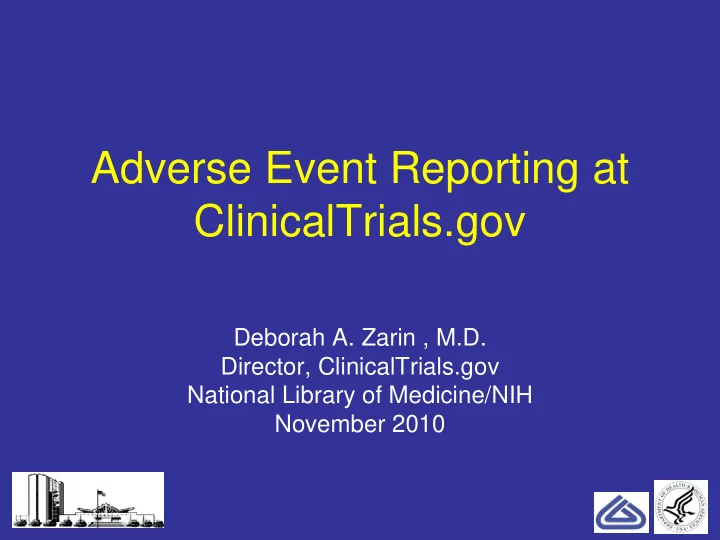

Adverse Event Reporting at ClinicalTrials.gov Deborah A. Zarin , M.D. Director, ClinicalTrials.gov National Library of Medicine/NIH November 2010 1
Adverse Event Reporting under FDAAA • FDAAA Title VIII covers certain clinical trials of drugs, biologics or devices • Summary results must be reported at the trial conclusion • Adverse Events (AEs) must be reported as part of the summary results – All SAEs – Other AEs that occur >5% frequency within any arm • These reporting requirements are independent of trial publication 2
Key Points • AEs are reported at trial completion • Summary information only – # and frequency per arm – No patient-level data • Includes all AEs regardless of: – Attribution – Whether or not anticipated • Enforcement provisions for non-compliance • Currently have results for >2,500 studies – 43% have associated publication • Structured, tabular data – Powerful search engine 3
4
Different Slices of the Same Data • A Phase III, Randomized, Open-Label, Multicenter Study Comparing GW572016 [lapatinib] and Capecitabine (Xeloda) versus Capecitabine in Women with Refractory Advanced or Metastatic Breast Cancer • GlaxoSmithKline • Sources: – GSK clinical trial register – New England Journal of Medicine – Drugs @ FDA: Lapatinib label 5
GSK Clinical Trial Register Timing: Most Frequent Adverse Events on Therapy AEs collected from first dose … to 30 days after last dose Frequency: Most frequent 10 events in each group Attribution: Not specified http://ctr.gsk.co.uk/Summary/lapatinib/studylist.asp 6
GSK Clinical Trial Register Any Serious Adverse Events on Therapy Timing: On-Therapy (first dose of study medication to last day of study medication) Frequency: Any (i.e., all) Attribution: related – considered by the investigator to be related to study medication 7
New England Journal of Medicine Timing: Adverse events through November 15, 2005 Frequency: Not specified Attribution: Not specified 8 N Engl J Med 2006;355:2733-43
FDA Approved Label Timing: Not specified Frequency: Occurring in > 10% of patients Attribution : Not specified 9
Potential for ClinicalTrials.gov • Strengths – Structured data tables with search capability – Uniform reporting rules – Includes some trial data not otherwise available to the public • Limitations – Scope is limited to certain drug and device trials – Rules govern data reporting, not data collection – Data only as good as what the sponsor enters 10
Recommend
More recommend